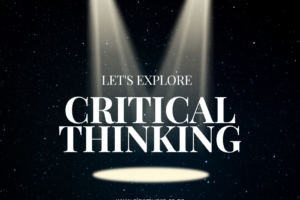What is critical thinking? When we hear the phrase ‘critical thinking’ we tend to assume…

How to ACE your next meeting
For many of us, work is all about meetings… which for many of us, can feel frustrating, unproductive, and simply a waste of your time. Here are a few tips on how to ACE your next meeting, I hope you enjoy.
The pre-meeting gathering
Before entering the room, pause and just take a moment to observe your state. Don’t judge, just notice…Do you feel rushed, annoyed, anxious, impatient? Take a few long slow breaths just while you’re standing there and just observe what is currently going on for you, gathering your attention into the present moment. Once you have that, consider how you would like this meeting to go; how would you like to represent yourself? What are your objectives for the meeting and for yourself personally? (I want to be more involved and have more of a voice… or I want to remain calm this time and listen to others… or I really want this issue resolved etc).
Pre-meeting insights
When you first enter the room, take a look at everything around you, not in a critical or judgemental way but simply as an observer noticing with curiosity. You may notice the clothing of your colleagues, you may notice the windows (or a lack of windows). Perhaps your meeting is at the client’s workplace or in their home, just quietly notice, what image do they portray, what are their interests, habits, values, etc.
The energy
Now is a good time to notice the energy in the room. Every meeting has a certain energy to be observed so just take that in for a couple of minutes. You may notice that someone is looking rushed, distracted, hostile, perhaps the energy is positive and everyone present welcomes a successful outcome. Now you can engage this meeting with a real sense of presence; a certain state of calm within yourself, knowing that you have a better understanding of the situation.
The meeting & you
Throughout the meeting remind yourself of your personal fall back position. At any time you can quietly observe yourself. Don’t forget, the degree to which you are present in the meeting is directly related to what you wanted to achieve prior to going in. If your mind has wandered simply bring yourself back, do a quick self-assessment;
* How am I feeling?
* Am I getting my message across as I wanted to?
* Do I feel heard?
* Am I listening to others openly and objectively without pre-judgment?
* Do I need to regather myself?
* I am representing myself as I wanted at the beginning of the meeting?
The meeting and others
Take time throughout the meeting to observe other people. Little adjustments may be required to keep everyone engaged, potentially saving another meeting later.
* Is anyone withdrawing? They may need an opportunity to voice themselves?
* Is anyone getting frustrated or angry, Is everyone still engaged and contributing?
The meeting’s energy
What is the energy driving this meeting;
* Has the meeting been hijacked and needs to get back on task?
* Is the conversation productive and progressive?
* Is there an underlying problem that needs further discussion to enable a successful outcome?
The outcome
The meeting comes to an end is always a great time to quickly reflect on the initial objectives and whether the meeting produced the desired outcome.
* Were there times during the meeting where you could have conducted yourself differently? If so how and if not, feel pleased that you achieved that for yourself.
* Were other people’s behaviors predictable or confusing to you and if confusing, what did you miss?
* Considering the information that you now have, what approach needs to be explored in more depth going forward?
* Are there areas that need further understanding?
* Which aspects went well and why?
Review
Take a moment to consider whether these steps were useful to you. Did you feel more present in the meeting, more gathered within yourself, more in control of your contribution to the meeting? How could this meeting have unfolded if you hadn’t observed in such a mindful manner? Is this a skill that you can take into other aspects of your day?
Remember, it may take practice before you really feel that this is benefiting you so take what you learn from each experience and build on it at the next meeting. I hope that this article has served you well are more confident in knowing how to ace your next meeting!



